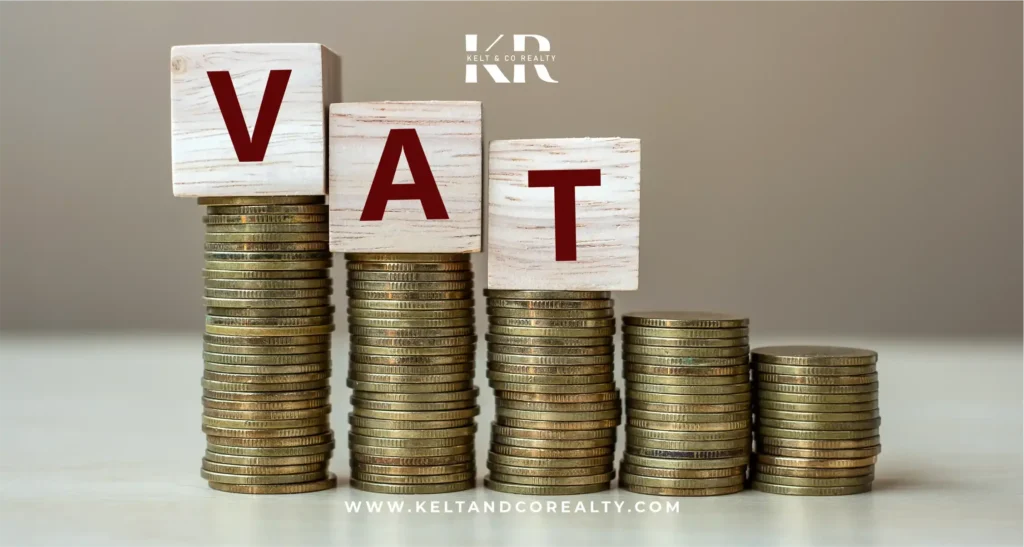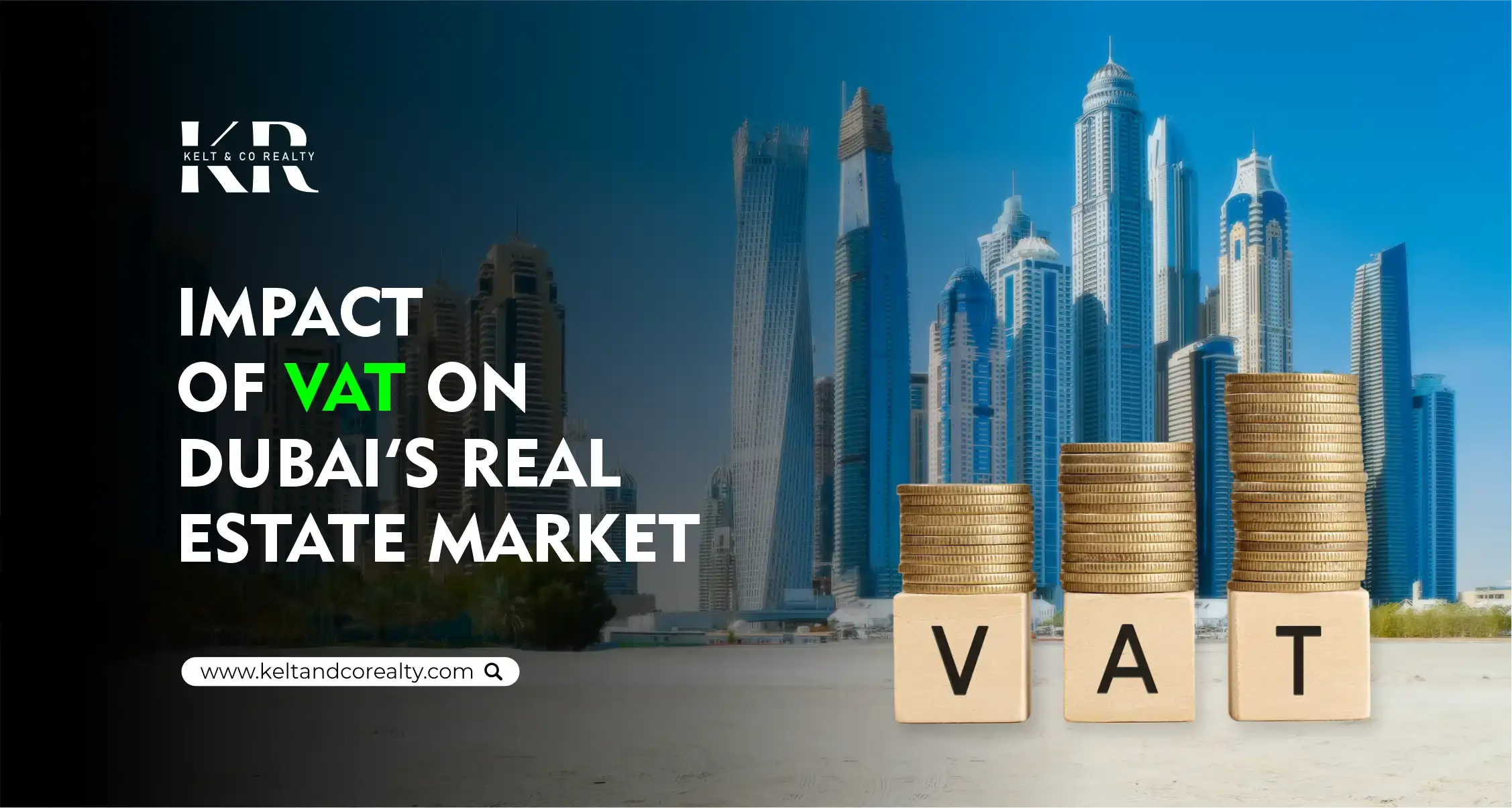
Dubai is known for its dynamic and attractive real estate market. Investors from all across the globe come to Dubai to take advantage of its tax benefits, investor-friendly policies, premium lifestyle, affordable luxury real estate, 100% property ownership rights to foreign investors and significant returns on investment (ROI). In simple terms, Dubai boasts a mix of luxury, innovative and affordable real estate.
Undoubtedly, Dubai is a global hotspot for real estate investment. However, one must understand the legal and tax structure of Dubai before making any investment decision. Dubai does not levy income tax and capital gain tax. Though, the United Arab Emirates introduced the Valued Added Tax (VAT) in 2018, reflecting a significant shift in the economic policy of the country.
If you desire to buy property in Dubai, then continue reading this blog to explore the role of VAT in Dubai’s real estate sector and how it impacts real estate transactions.
Understanding VAT in Dubai Real Estate
Normally, Valued Added Tax (VAT) is considered a tax on the supply of goods and services. And when it comes to real estate, this tax is applied on the sale and lease of properties. The UAE introduced this tax in 2018 and since then it has been applied to certain real estate transactions. The VAT rules and rates are not the same but differ based on the property type. When a property is leased or sold then this particular tax is applied.
No VAT is charged on the first sale or lease of a residential property in Dubai, UAE. If the first sale or lease occurs within 3 years of the development then the developer will also be able to recover VAT spent during construction. It means the first supply of a residential building is simply zero-rated. Following the initial 3 years, VAT is still not charged in case of residential properties but developers now would not be able to recover VAT spent on construction.
Incomplete or under-construction or off-plan properties for sale in Dubai are also not levied VAT because these properties are future supplies and VAT is not charged at the time of sale. Bare lands or undeveloped lands are also exempted from Value Added Tax in Dubai. However, in the case of commercial properties, a standard 5% VAT is applied on the sale and lease of such properties.

VAT Application on Residential Properties
Normally Value Added Tax is not applicable on residential properties in Dubai, UAE. The term “residential properties” includes villas, apartments, townhouses, student housing, orphanages, nursing homes and residential accommodations for police and armed forces. A residential property is considered zero-rated if the first sale occurs within the first 3 years of the development of that property. It means no VAT is charged for such properties and also owners can claim back VAT spent on construction.
VAT is also exempted in the case of resale properties. However, investors are bound to pay VAT on services and commissions related to the sale. Tenants who intend to stay for a longer period are also not required to pay VAT on rent but they are supposed to pay rent on services like electricity, water, etc.
VAT on Commercial Real Estate
The sale and lease of commercial real estate in Dubai, UAE that includes office spaces, stores and warehouses are subject to 5% Value Added Tax. This tax is always applicable to all sorts of commercial properties. Unlike residential properties, commercial properties are not exempted from VAT. Properties that are worth over AED 5 million are also considered capital assets under UAE VAT rules.
VAT on mixed-use properties:
In the case of mixed-use properties, VAT is applied proportionally. It means residential units are not subject to Valued Added TAX in a mixed-use development but commercial portions are taxable and the same 5% is charged.
VAT On Off-Plan Projects
Off-plan properties for sale in Dubai, UAE are normally considered zero-rated because VAT is not levied on the sale price. Incomplete or under-construction properties are deemed future supplies that’s why they are not subject to VAT at the time of sale.

VAT’s Impact on Real Estate Investment In Dubai
Dubai is largely a tax-free economy. There is no income tax, capital gain tax and inheritance tax in Dubai which makes Dubai one of the best real estate investment destinations for foreign nationals. Though Value Added Tax normally increases the cost of properties for sale in Dubai, mainly impacting the ability of investors who tend to purchase commercial properties but it does not demotivate investors. Because Dubai extends a range of benefits to property investors such as property ownership rights, long-term visa options, etc. Though it may have some impact, it could not diminish the charm and captivation of Dubai’s real estate.
Conclusion
Valued Added Tax in Dubai is levied on the sales and lease of real estate. Residential properties are largely exempted from VAT. If a residential property is sold or leased out within 3 years of construction, VAT is not charged and also owners can claim back VAT spent on construction. Commercial real estate in Dubai, UAE is levied 5% VAT. Off-plan properties are also exempted from VAT. Valued Added Tax may affect the overall affordability of a property. Characteristics of Dubai’s real estate such as the VAT exemptions on residential and off-plan properties, 100% property ownership rights for foreign investors, tax benefits and the Dubai Golden Visa continue to make it an attractive real estate investment destination in the world.
Expert Guidance For Your Real Estate Investment In Dubai!
Kelt and Co Realty is a prominent real estate agency in Dubai. This property company helps people buy, sell and rent all sorts of residential and commercial properties. People who desire to buy property and own their dream real estate in Dubai should get our services because our team is passionate about delivering excellence and offering tailor-made real estate services.
FAQs
Is VAT charged on residential properties?
Normally VAT is not charged on residential properties in Dubai, UAE. Developers can also recover VAT spent on construction if the first sale or lease happens within three years. Following it, VAT is still not charged but developers cannot claim back VAT spent on construction.
What are the benefits of investing in Dubai’s real estate?
Dubai offers a range of benefits to property investors such as property ownership rights, long-term residency options, tax benefits and exceptional returns on investment.
Can VAT be recovered in Dubai on construction costs for residential properties?
Yes. Developers can claim VAT on construction costs for the first sale of residential properties if it occurs within the first three years of construction.
What types of residential properties are subject to VAT?
Residential properties that are leased to non-residents for short-term periods (less than six months) are subject to VAT.





